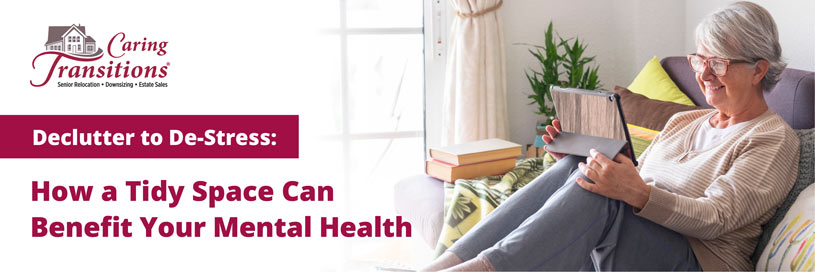
Containing the clutter in your home is good for your mental health! Although we all have different levels of tolerance when it comes to clutter, studies have shown that an untidy home can increase stress, whereas a tidy home can help you feel more secure and calm.
How Does Clutter Contribute to Stress?
- A messy home can consciously or subconsciously distract you to the point of physical and mental anxiety, causing an inability to relax.
- Clutter can cause you to feel burned out and overwhelmed because you constantly feel pressured to clean.
- You may feel embarrassed if you have unexpected company.
- A house in disarray makes it easier to lose things and harder to find them.
- Everyday Health explains that the stress and anxiety you experience from clutter may push you to choose more comfort foods than healthy options: “A study published in January 2016 in the journal Environment and Behavior found that spending time in a chaotic, messy kitchen can contribute to an out-of-control mindset, and people in that type of kitchen chose higher-calorie snacks than people in a neater kitchen.”
- A disorderly living space can cause feelings of insecurity.
How Does Decluttering Help You Destress?
Purging your home is active work, which means it can release endorphins. According to Healthline, endorphins are neurotransmitters that can contribute to “reduced rates of depression and anxiety, improved mood, decreased pain and discomfort, and increased self-esteem.”
Additionally, when you declutter, you may feel productive, successful, and relieved, all of which help you feel less stressed.
Tidying up can be cathartic, especially if it’s part of a routine. For example, clearing the coffee tables and counters before bed every night may relax you. Many people find the process of putting things away or sorting things to be very calming.
You may feel more focused and less physically agitated in a freshly cleaned home. Even if you’re not consciously aware of it, clutter sends your brain constant visual stimulation. So your brain may be working on overdrive, making it more difficult to concentrate and relax.
With less clutter, you have fewer things to clean and organize. You won’t be grappling with the feeling of “There’s so much to do around here.” Plus, owning fewer items minimizes decision fatigue—you don’t have to make constant decisions about where to put things.
The state of your home can affect your eating habits and depression symptoms, according to studies. According to Prevention, “A 2009 study in The Personality and Social Psychology Bulletin found that women who described their homes as cluttered and stressful were more depressed than those who described them as restorative spaces. This isn’t surprising, considering plenty of studies have linked a tidier home to healthier habits—like exercising and making smart snack choices—which can really pay off for your overall health and outlook.”
Finally, decluttering can help you feel more confident if you have company. You won’t have the anxiety of wondering "What will they think of this mess?" "Where can I put these so they won’t see?" or any of the worries that come with scrambling to clean a house for company.
How to Declutter Quickly & Less Stressfully
A little decluttering each day builds a habit you may begin to look forward to. The key is starting with a plan to make it less overwhelming.
A Little Planning Makes Decluttering More Effective
Know ahead of time what you are going to do with items. For example, will you donate items, give things to family members, or sell high-value furniture? Making a plan for your items will help you avoid placing everything in a closet or garage indefinitely. Out of sight doesn’t necessarily mean out of mind.
If you’re not sure where to start or how to stay organized in the process, you may want to use a decluttering checklist or take a 30-day declutter challenge. These are great tools to help you stay on track and feel less overwhelmed.
Struggling to Get Started?
Some people struggle to part with items due to an internal conflict. For example, perhaps you are finding it difficult to let go in your life. Holding on to the items may be an attempt to gain back some kind of control.
Our beliefs about clutter also influence how we feel about it. For example, many people feel like they are missing the mark if their house is a little cluttered. This can lead to feelings of diminished self worth.
Examining how you feel and think about clutter can help you move forward to a clutter-free home.
Tips for a Stress-Free Declutter Session
- Set a timer and just get started. This builds momentum!
- Establish a fifteen-minute end-of-day routine to destress before bed.
- Clear off main surfaces first.
- Set aside some time to clean out your car. Declutter your phone and computer. Sometimes if you have too many apps on your phone, or too many files on your computer, or your email is almost full with years’ worth of mail, it can be very cathartic to just delete some files and organize your desktop.
One final piece of advice, whether you’re a decluttering expert or taking on the challenge for the first time: Keeping a tidy space is an ongoing process. It’s okay to give yourself grace.
Caring Transitions can help reduce the stress of decluttering. Learn more about our relocation, downsizing, and estate sales services.